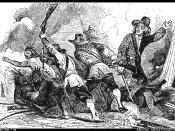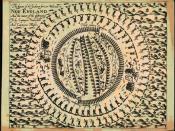The early 1600s brought the first European settlers to the Americas, and on arriving they found the land inhabited by thousands of Native Americans. The colonists' lack of knowledge about the land and people led to a series of disputes to ensure the colonists' safety. Unfortunately, this eventually led to genocide, an act of hatred directed towards the natives, but undeniable because overtime the colonists began to kill for sport rather then defense against the Indians' attacks.
By 1607, when the European colonists arrived at Jamestown, the Pequots numbered 14,000, but in the next hundred years that number would decrease by ninety-five percent, leaving a mere 600 survivors. The Abenaki group of Vermont and New Hampshire decreased ninety-eight percent, with 250 left alive. These death tolls are just a couple of the many that occurred, and sadly most of the decrease in the Natives' population happened before the epidemics raged.
This leads one to believe that it was the colonists' influence on the Natives that led to such a drastic population increase. Then, in the mid 1630s, the natives suffered another population decrease due to the many diseases that were threatening many Indians. Many of the Puritans felt that the epidemics' effects were a gift from God, and that the Indians were the Devil's workers.
In 1636, a Pequot was accused of murdering a colonist. The settlers went on a rampage to seek revenge. They burned the natives' villages, and shot and killed many leaving only seven to escape. One year later, during the Pequot War, the colonists killed all but five natives when raiding their fort. This slaughter was described as "a sweet sacrifice" and the colonists "gave praise thereof to God." (-C. Mather) It appears that these two raids happened when the colonists feared for their safety. One...



English colonists and genocide
I can see that you did some research and you placed some effort in this paper. However, it is a bit abrupt and short. You should add a bibliography and extend your work a bit. Could do with a little work but you're definitely getting there!
0 out of 0 people found this comment useful.